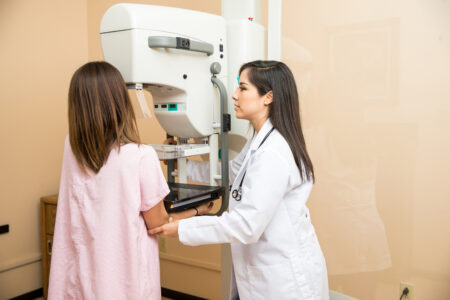
Share On Social!
Cancer continues to be a leading cause of death for Latinos and all people in the US.
But thanks to modern medicine, which includes cancer screenings, prevention techniques, and treatments, the number of cancer survivors is on the rise.
Researchers are constantly working on new ways to mitigate and manage cancer and symptoms.
However, some of these can come from unlikely places.
For instance, researchers have found a link between the COVID-19 vaccine and the cancer immune system, according to a new publication in the journal Nature.
Let’s go over the findings and what they mean for cancer patients.
Research Findings on COVID-19 Vaccine and Cancer
The discovery was made when researchers were developing mRNA vaccines for brain tumor patients back in 2016.
During this time, they found that mRNA can help the immune system response to kill tumors.
 To reach this conclusion, researchers examined clinical data from more than 1,000 late-stage melanoma and lung cancer patients who received immune checkpoint inhibitors, which is a specialized kind of immunotherapy treatment.
To reach this conclusion, researchers examined clinical data from more than 1,000 late-stage melanoma and lung cancer patients who received immune checkpoint inhibitors, which is a specialized kind of immunotherapy treatment.
This type of treatment works by “blocking a protein that tumor cells make to turn off immune cells, enabling that immune system to continue killing cancer,” according to an accompanying Live Science article on the research findings.
What’s more, this type of treatment has succeeded in helping create cures for cancers that were deemed incurable up to a certain point.
While studying this patient group, researchers found that patients who received the mRNA-based COVID-19 vaccine up to 100 days of starting this treatment were more likely to be alive after three years compared to those who didn’t receive the vaccine.
To further study the relationship between the COVID-19 mRNA vaccine and immune checkpoint inhibitors, researchers plan to conduct a clinical trial to determine if the vaccine should be a standard part of treatment for patients undergoing immune therapies.
“This work exemplifies how a tool born from a global pandemic may provide a new weapon against cancer and rapidly extend the benefits of existing treatments to millions of patients. By harnessing a familiar vaccine in a new way, we hope to extend the lifesaving benefits of immunotherapy to cancer patients who were previously left behind,” researchers told Live Science.
Volunteer for a Cancer Clinical Trial
Participating in research studies and clinical trials are a vital part in creating new treatments and interventions for cancer.
Clinical trials are studies that help researchers learn more to help slow, manage, and treat cancer for current and future family members. But without well-rounded volunteers for clinical trials, the benefits may miss a certain group.
To prevent this, volunteer for a clinical trial by visiting our clinical trials page or read about hero volunteers.
“Volunteers in clinical trials are not only helping themselves, but they’re also building a future with better treatments that can help their families in the future,” said Dr. Amelie Ramirez, director of Salud America! and the Institute for Health Promotion Research at UT Health San Antonio.
Those looking for opportunities based in San Antonio can search the Mays Cancer Center at UT Health San Antonio’s Find a Clinical Trial database to learn more about available clinical trials and eligibility requirements.
On a national level, visit clinicaltrials.gov to find a clinical trial near you.
By The Numbers
142
Percent
Expected rise in Latino cancer cases in coming years



